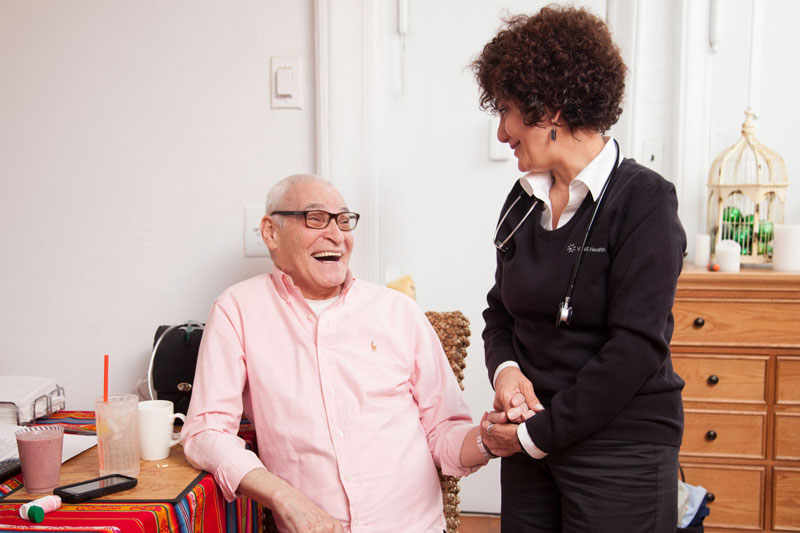
As you or a loved one faces an advanced illness, you can count on the VNS Health Hospice Care team for help and support. From pain and symptom management, to time with family and friends, to emotional support and spiritual care, we’re here for you.
What Is Hospice Care?
Sometimes a person’s illness may not be curable, or they may decide not to receive any more treatment. Although this decision might feel isolating, you and your loved ones don’t have to go through this alone.
Hospice care is a special kind of care focused on comfort and quality of life in a person’s last months of life, and it is often provided where that person lives — in their own home or in a nursing facility.
Hospice care includes medical care related to the person’s illness, as well as emotional support, spiritual care, practical help, and personal care. Hospice care also supports caregivers and family members through their loved one’s illness and beyond.
Looking for a different service?
When Is It Time for Hospice Care?
You and your loved one might have a lot of different feelings about starting hospice care. Maybe it’s hard for both you and your loved one to accept what starting hospice care means. You might feel like going on hospice is giving up. These feelings are all valid, and it’s important to remember that you’re not alone in feeling them.
By starting hospice care, you’re not admitting defeat. What you’re really saying is, “I love my loved one. I care deeply about them and want whatever time they have left to be comfortable, letting them live out their life somewhere familiar and surrounded by the people they love.”
Although people may be uncomfortable talking about hospice care, most people and their families benefit from it. It can provide comfort and peace to your loved one while also relieving some of your caregiving load — allowing you to spend more quality time with them. Family members and caregivers often say that the support they received from hospice reduced feelings of guilt and worry. In fact, many people say they wish they’d started hospice care sooner.
It might be the right time to consider hospice if:
- You want your loved one to get relief from pain or other symptoms in the comfort of their own home or other familiar surroundings.
- Your loved one has been spending more time in the hospital or going to the emergency room more often.
- You are worried that your loved one will die in the hospital without loved ones nearby or that they will receive unwanted aggressive treatment.
- Your loved one has an illness such as heart failure, COPD, end-stage kidney disease, dementia, or cancer that is considered terminal.
Starting hospice care as early as possible can reduce your loved one’s pain and other symptoms. It can help them breathe easier and feel less tired.
See if hospice care is right for your loved one.
Common Myths About Hospice Care
Many people have a lot of anxiety about death or dying. Misinformation can keep you and your family from knowing what resources and care are available to you.
Our goal at VNS Health is for everyone to have everything they need to make an informed decision about hospice.
Hospice is a good option for anyone with a condition that is likely to claim their life within 6 months.
Making the choice to actually begin hospice can feel overwhelming, but many patients and families find that hospice’s emotional support and pain management make a huge difference. Those who wait to enroll often wish they had started hospice care sooner.
People often think they need to go to a hospice care facility to receive care. This can feel like a scary change if you think hospice means you have to leave the comfort and familiarity of your home.
In reality, home hospice providers like VNS Health bring compassionate hospice care to where a person lives.
Your hospice nurse and other professionals on your care team will make home visits to provide the care your loved one needs. Most often, that happens in a house or an apartment. It can also be in a nursing home or an assisted living facility.
Some people think that when they sign up for hospice care, they need to give up their doctors or stop all medication and treatment.
This is not true. Your doctors have been an important part of your treatment, and they will continue to be. Hospice care addresses only the terminal illness, and hospice care teams work closely with the doctors who have overseen your treatment as your condition changes. If you have other health needs, the doctors you see will continue to treat you.
A person in hospice care no longer receives treatments to cure their illness. Instead, they receive a care plan that includes everything needed to address the symptoms of the illness and to improve or maintain their quality of life.
What to Expect During Your First Visit
The main goal of hospice care is to ensure that your or your loved one’s last months are as comfortable and meaningful as possible. Hospice care respects your wishes, so home hospice services are based on each individual and family’s goals.
VNS Health hospice services include not only medical care and support but also personal and emotional support as well.
What to expect as a patient…
- Home visits and care from your hospice team, which may include a hospice nurse, physical or occupational therapist, speech-language pathologist, registered dietitian, respiratory therapist, or VNS Health Hospice Care physician as needed
- Medication for pain relief or controlling other symptoms
- Medical supplies, such as a hospital bed, a wheelchair, an oxygen tank, or wound care supplies
What to expect as a caregiver…
- Education about how to care for your loved one, what to expect, and what to do in an emergency
- Round-the-clock access to a hospice nurse through VNS Health’s caregiver helpline
What to expect as a patient…
- Help with bathing, grooming, shaving, and brushing teeth
- Help going to the bathroom
- Food preparation and feeding, as appetite and ability to eat change
- Changing sheets without having to move the patient from the bed
What to expect as a caregiver…
- Guidance with practical matters
- Respite care, which allows you to take a break or even attend an important family event knowing that your loved one is cared for
What to expect as a patient…
- Someone to listen and help address any fears
- Help in asking and extending forgiveness
- Counseling to let go of guilt, shame, or regret
- Support in mending important relationships
What to expect as a caregiver…
- Emotional support and spiritual care to help you cope with your own feelings — and support your children or others
- Help making decisions about care
- Support in resolving family issues
- Grief support for 13 months, to help you and your family through milestones and anniversaries
Paying for Hospice Care
Hospice care is covered by Medicare, Medicaid, the Veterans Administration, and most private insurance companies. Learn more about paying for home hospice care.
